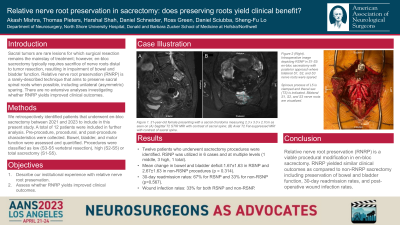Relative nerve preservation in sacrectomy: does preserving nerve roots yield clinical benefit?
Relative Nerve Preservation in Sacrectomy: Does Preserving Nerve Roots Yield Clinical Benefit?
Friday, April 21, 2023


Akash Mishra
Medical Student
Donald and Barbara Zucker School of Medicine at Hofstra/Northwell
ePoster Presenter(s)
Introduction: Sacral tumors are rare lesions for which surgical resection remains the mainstay of treatment; however, en-bloc sacrectomy typically requires sacrifice of nerve roots distal to tumor resection, resulting in bowel and bladder functional impairment. Relative nerve preservation (RNP) is a rarely-described technique that aims to preserve sacral spinal roots when possible, including unilateral sparing. Here, we describe our experience with en-bloc sacrectomy and sacral RNP, and assess whether RNP yields improved clinical outcomes.
Methods: We retrospectively identified patients that underwent en-bloc sacrectomy between 2021 and 2022 to include in this study. Pre-procedure, procedural, and post-procedure characteristics were collected. Bowel, bladder, and motor function were assessed and quantified. Procedures were classified as low (S3-S5), high (S2-S5), and total sacrectomy (S1-S5).
Results: Twelve patients who underwent en-bloc sacrectomy were identified (3 middle, 3 high, 6 total sacrectomy). RNP was utilized in 6 cases and at multiple levels (1 middle, 3 high, 1 total). Mean scored bowel and bladder deficit following sacrectomy without RNP was 2.17 +/ 1.60 compared to 2.67 +/ 1.63 with RNP (p=0.604). Change in scored bowel and bladder function (relative to pre-procedure) without RNP was 1.67 +/ 1.63 compared to 2.67 +/ 1.63 with RNP (p=0.314). 30-day readmission rates were 67% for RNP and 33% for non-RNP (p=0.567) and rates of wound infection were 33% for both RNP and non-RNP.
Conclusion : RNP is a viable procedural modification in en-bloc sacrectomy. Controlled trials are required to better elucidate improvements in bowel and bladder function. Future analysis will also investigate effect of RNP on procedural workflow, including total operating time.
Methods: We retrospectively identified patients that underwent en-bloc sacrectomy between 2021 and 2022 to include in this study. Pre-procedure, procedural, and post-procedure characteristics were collected. Bowel, bladder, and motor function were assessed and quantified. Procedures were classified as low (S3-S5), high (S2-S5), and total sacrectomy (S1-S5).
Results: Twelve patients who underwent en-bloc sacrectomy were identified (3 middle, 3 high, 6 total sacrectomy). RNP was utilized in 6 cases and at multiple levels (1 middle, 3 high, 1 total). Mean scored bowel and bladder deficit following sacrectomy without RNP was 2.17 +/ 1.60 compared to 2.67 +/ 1.63 with RNP (p=0.604). Change in scored bowel and bladder function (relative to pre-procedure) without RNP was 1.67 +/ 1.63 compared to 2.67 +/ 1.63 with RNP (p=0.314). 30-day readmission rates were 67% for RNP and 33% for non-RNP (p=0.567) and rates of wound infection were 33% for both RNP and non-RNP.
Conclusion : RNP is a viable procedural modification in en-bloc sacrectomy. Controlled trials are required to better elucidate improvements in bowel and bladder function. Future analysis will also investigate effect of RNP on procedural workflow, including total operating time.
